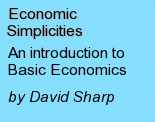




INTRODUCTION
TO ECONOMICS
Lesson 01/06
CAPITAL
Capital is a word
with many meanings. We are
concerned in this lecture with capital as understood in the discipline
of economics; the capital of capitalism, not that of Canberra, upper
case letters or accountancy.
The etymological
origin of the word capital is “caput”, the Latin for “head’,
probably referring to cattle or slaves, two of the earliest resources,
usually numbered or measured by the head.
Its use in economics was popularised, if not invented, by Karl
Marx [1818-1883], with the publication, in 1867, of the first volume of
his 3 volume work “Capital”. As
such it was it was intended and used as a term of opprobrium.
The meaning and role of capital in economics is a matter of some dispute although there is general agreement that it is of major significance in any but the most basic societies. The traditional definition is that it comprises the store of produced goods set aside and available for the production of future goods and services.
LAND, LABOUR AND
CAPITAL
Classical
economists typically defined the components or factors of production as
Land, Labour and Capital [with the occasional concession that
Entreprenuership, ie the conceiving, organizing and initiating of
production, might constitute a fourth factor].
By definition each was mutually exclusive.
Land comprised all naturally occurring resources such as
geography, climate and minerals. Labour
was the human contribution. Capital
was man-made production not intended for immediate consumption or to be
totally used up in immediate further production, such as is the case
with raw materials or intermediate goods.
To that extent capital can be seen as tools.
Wealthy societies
are characterised by their accumulated capital.
It is capital that distinguishes the productivity of different
societies. The reason that
the typical Australian worker is more productive than say the typical
Papua New Guinean worker is the greater supply of capital available to
the Australian. It is
productivity that provides the standard of living enjoyed and pays the
typically much higher wages of the Australian.
Increasing the amount of capital available to a workforce can be
expected to improve its marginal productivity.
Conversely a decline therein can be expected to have the opposite
effect.
Since capital eventually wears out or is consumed it is necessary to maintain and replace it if productivity is to be maintained. If productivity is to be improved it will be necessary to increase the amount of capital available. Capital is created and maintained by saving and investing the saved production in plant and equipment whereby increased production follows, thereby enabling increased consumption and /or further capital formation and maintenance. If sufficient saving for whatever reason does not occur then there will be dissaving and capital decumulation with the consequence of a decrease in the standard of living.
HUMAN CAPITAL
Partly in reaction
to the classical view that labour, as one of only three discrete factors
of production, was homogenous and easily interchangeable, some modern
theorists have suggested that investment can occur in labour thereby
creating what is sometimes referred to as human capital.
Credit for the same is generally given to a seminal article in
1958 by Jacob Mincer and a 1964 book by Chicago School economist Gary
Becker in 1964 entitled Human Capital.
The concept of
human capital contemplates that one can invest in a human being much as
one can in physical means of production by way of education, training,
medical and health services with the intention of achieving a return
through increased productivity, to a certain extent at least in
substitution for physical capital.
Critics of the concept point out that human capital is not really akin to capital; regardless the worker must continue to work to achieve a return. Nor is human capital transferable. Where the investment is not self-investment it leaves humans open to be treated as property. This is of particular concern given the existence of alleged “brain drains” whereby highly capitalised individuals are enticed or otherwise choose to move to more rewarding situations amidst claims that they should not be free to take their human capital with them
NATURAL CA
Natural capital is
a phrase used to refer to a concept that the minerals, plants and
animals of the earth are more than the mere passive resources denoted by
the classical concept of Land. In
recent times, many environmentalists have embraced the concept.
Proponents of the concept of natural capital argue that investment occurs with respect to diverse natural situations to improve their productive capacity such as farms, mines, winds and tides. Similarly natural systems can be degraded and or reduced in productive capacity by the actions of man. Critics point out that the concept is difficult to conceptualise or quantify and question its ultimate use.
CULTURAL CAPITAL
Culture relates to
who and what we are as a result of learning.
It is the sum of our nurture rather than our nature. The concept of cultural capital is the consequence of an
interplay between various disciplines such as history, sociology,
political science and economics. The
thrust of the concept varies depending on the basis of the respective
discipline in which it is being contemplated or discussed.
From the viewpoint
of economics cultural capital is an asset whereby value flows from our
aesthetic, religious, political, social and historical heritage which is
bequeathed to us by our ancestors and arises from our upbringing. What role does our religious convictions, our political
and social organization, our class, our gender relationships and
attitudes and our history generally play in the achieving of beneficial
returns? Can we invest in
ourselves to increase our cultural capital and thereby increase our
returns?
Whilst it is
possible to discern various consequences flowing from cultural
differences, such as the differing performances of North and South Korea
and the former East and West Germany, critics raise similar criticisms
to the concept of cultural capital as a separate and discrete factor of
production as they do with the concept of natural capital.
David Sharp